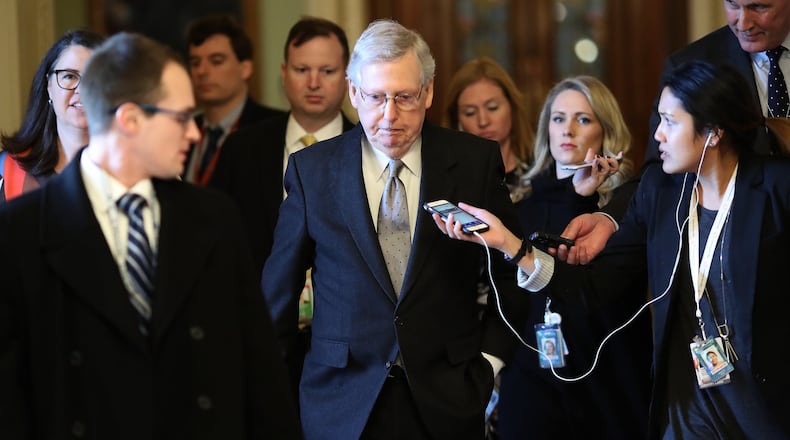The partial federal shutdown struck just as Willie J. Donaldson began to believe he could save his home from foreclosure.
A stroke weakened his legs and forced him from his job as a maintenance worker. Unemployment and medical bills put the Bainbridge man tens of thousands of dollars behind on his mortgage payments. Donaldson, 61, lost hope until a pro bono lawyer found a state program that could save his home.
The catch is that to ensure he qualifies for the program, Donaldson needs to submit information from the U.S. Department of Agriculture rural housing program that helped him buy his home. When his lawyer calls, all she gets are recorded greetings that say the office is closed.
Donaldson’s home is scheduled for foreclosure Feb. 5. If he loses it, he has nowhere to go, he said.
“Day and night and all the time, that’s what I worry about,” he said.
The more than 135,000 low-income Georgia households that rely on the federal government's vast system of affordable housing subsidies are beginning to feel the sting of the partisan budget impasse that has now stretched 34 days. The U.S. Department of Housing and Urban Development furloughed roughly 95 percent of its employees, including most of its health and safety inspectors, according to the department's contingency plan.
Key contacts at HUD, USDA and other federal agencies that provide seniors, the disabled, and the working poor with housing assistance aren’t responding to calls or emails.
Experts said more widespread hardship won't begin until late February or March, when money for the housing choice voucher program, formerly known as Section 8, will begin to run out. That's also when another critical funding stream for roughly 1.5 million low-income Georgians — the Supplemental Nutrition Assistance Program, previously known as food stamps — is expected to run dry.
Funding for 960 households in 35 Georgia apartment complexes has already evaporated or will disappear by February, according to figures from the National Low Income Housing Coalition (NLIHC). Local experts and HUD data suggest the number of complexes that lost funding may be higher.
More than 60 percent of the impacted units are in metro Atlanta’s five four counties, according to data from the NLIHC.
“The people who participate in these programs, these are among the most vulnerable in the communities we serve. These are people with disabilities, seniors, working single parents, survivors of domestic violence,” said Lindsey Siegel, a senior attorney at the Atlanta Legal Aid Society, “A lot of our clients live paycheck to paycheck. And one hiccup for even just a single month could mean that they’re at risk of homelessness.”
A HUD Atlanta regional office spokesman did not return calls requesting comment.
‘Kind of frightening’
If the shutdown continues, it may destabilize the affordable housing system, which even in the best of times fails to serve millions of people who could qualify for help. Public housing agencies spent years building trust with landlords who refused to accept vouchers because they thought HUD payments would arrive late, said Bambie Hayes-Brown, president and CEO of Georgia Advancing Communities Together, Inc., which assists nonprofit housing and community development organizations.
A key reason why owners provide low-income housing is because HUD guarantees that rent will be paid, Hayes-Brown said.
“They’re going to think — what happens if the government shuts down again and I don’t get any more payments? How am I going to service the debt? How am I going to pay my mortgage? How am I going to pay for repairs?” said Hayes-Brown.
Local housing advocates said they do not know of any residents who have been evicted because HUD failed to pay rent subsidies, but beneficiaries are becoming anxious. The voucher program has covered roughly 70 percent of Virginia Freeman’s rent since a heart attack in 2009 left her unable to work.
“Without that help, my options are pretty low,” said the 58-year-old Decatur resident.
It was hard for Freeman to find a landlord who would accept the vouchers, and she’s moved twice in recent years because of a break-in and flooding. Losing her voucher could be an even worse setback. Freeman would be forced to move in with her son, a veteran who suffers from post-traumatic stress disorder, or her daughter, a single mother with five small children.
“Life is life and you’ve got to make adjustments. But (losing the housing vouchers) is something that’s kind of frightening,” Freeman said.
The shutdown stalled at least one Legal Aid case involving HUD, attorney Siegel said. Teresa Coleman, who has brittle bone disease, said her Decatur apartment complex lacks sidewalks, which are required under law for disability access, and she wants HUD to put some in. The 53-year-old housing choice voucher holder must ride over seven speedbumps in her motorized wheelchair to get from her front door to the street.
“When I go over them it hurts real bad by my bones,” Coleman said. “It’s just really miserable.”
Atlanta agency working to continue services
For now, local government agencies and private owners are working to ensure that residents stay in their homes no matter how long the shutdown lasts.
Atlanta’s housing authority has enough reserve funding to operate programs for its its 46,000 residents through June, said Brandon Riddick-Seals, interim president and CEO of Atlanta Housing. It is creating “worst-case scenario” plans by contacting the private sector and charities to see if they can bridge funding gaps, he said.
“Our priority right now is to make sure that we maintain continuity of home, and we hope to keep this (uncertainty) as short-lived as possible,” he said.
Presbyterian Homes of Georgia houses low-income seniors in more than 200 units at Calvin Court in Atlanta’s Buckhead neighborhood and Philips Tower in downtown Decatur. Presbyterian homes will rely on reserve funding to continue services to its residents during the government shutdown, said Gwen Hardy, Chief Operating Officer.
“We are in the business of taking care of seniors, and we want the subsidy to continue so that residents do not feel any impact,” Hardy said.
Keep Reading
The Latest
Featured





